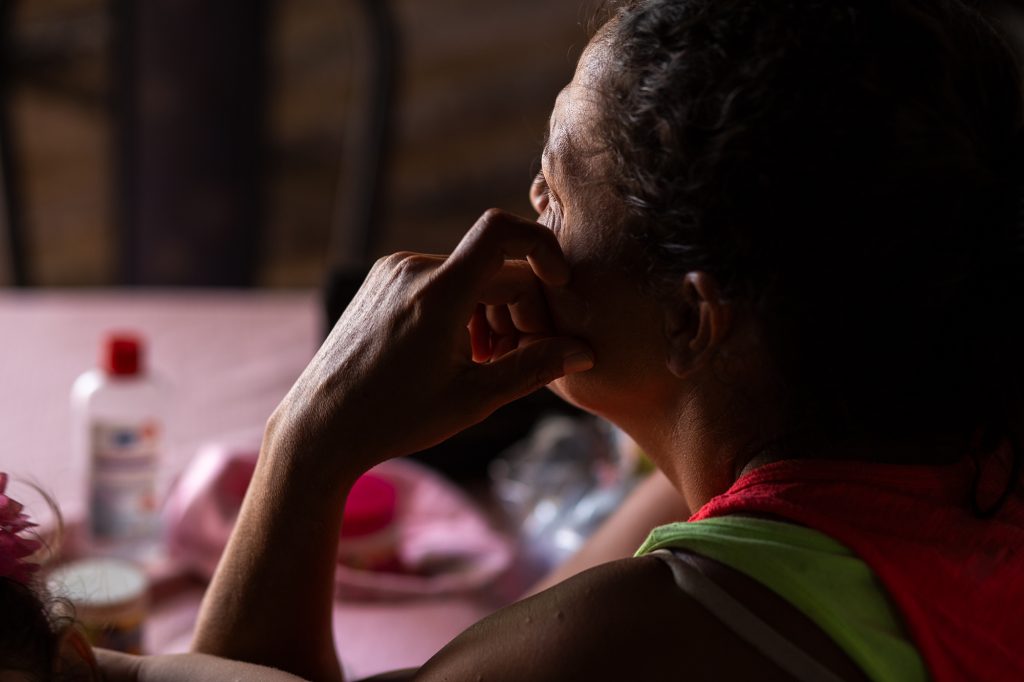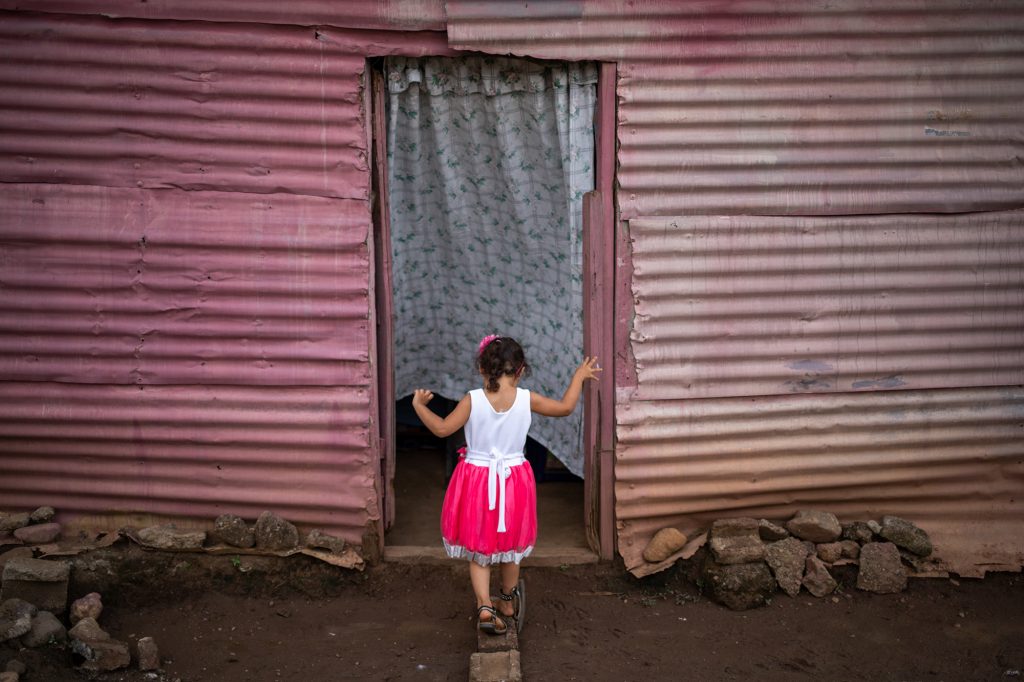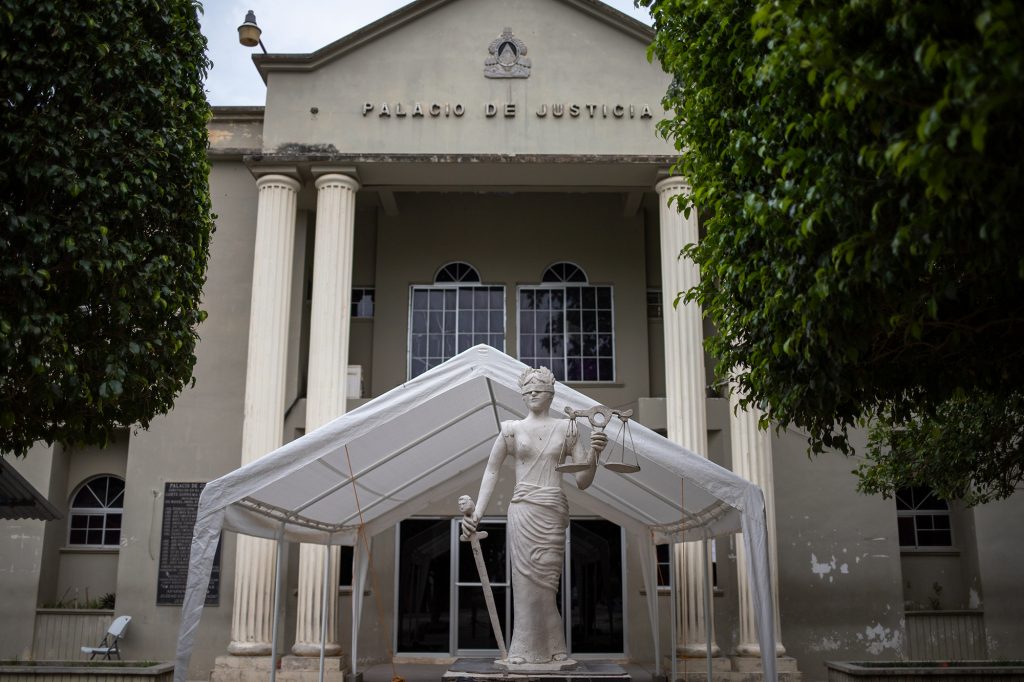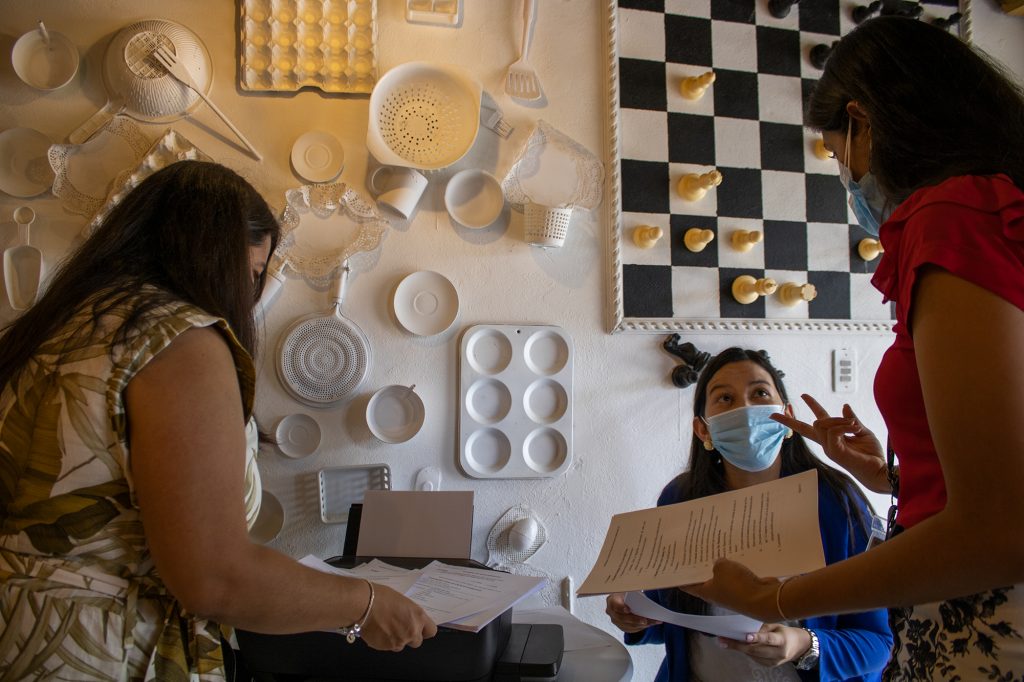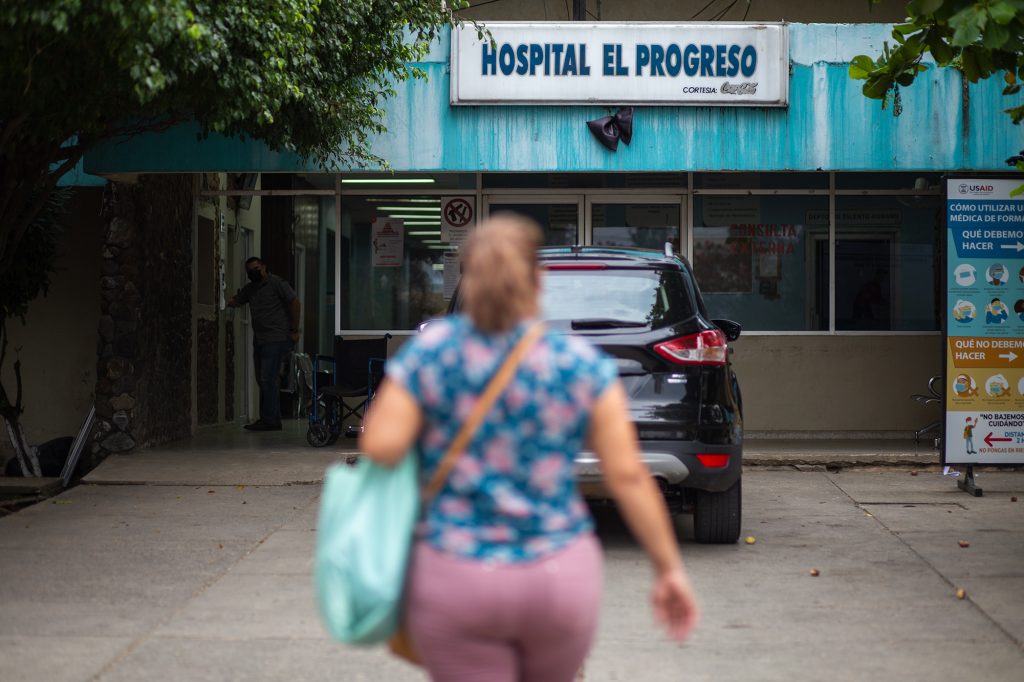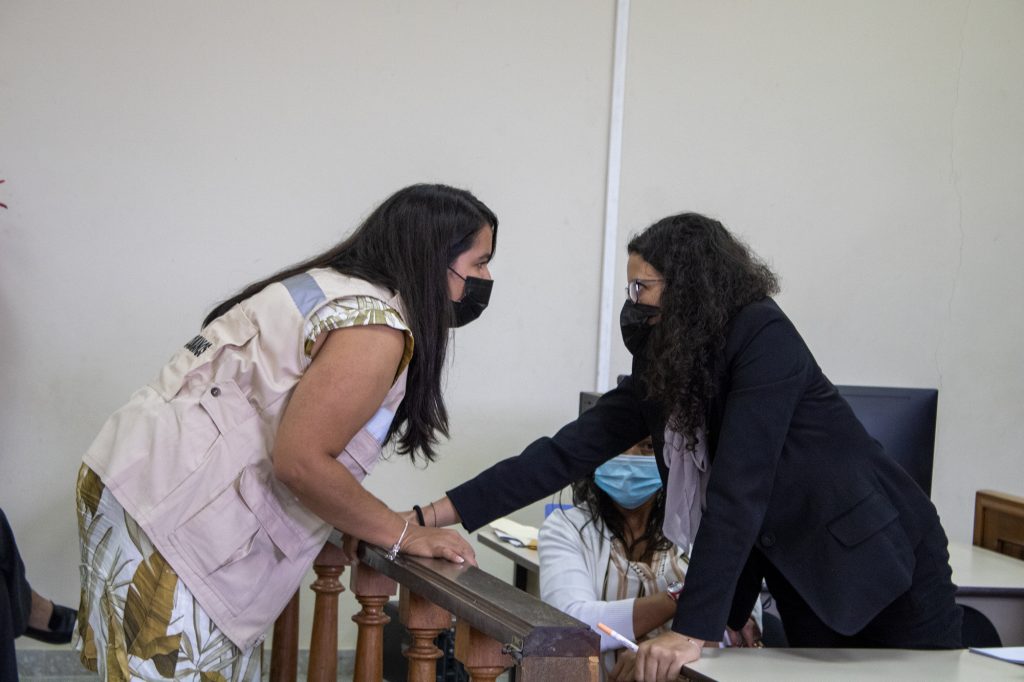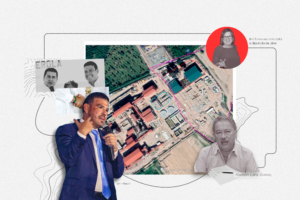In 2010, Victoria suffered a miscarriage and rushed to hospital. She didn’t know she was pregnant. Then hospital staff reported her to the authorities for abortion. The ensuing legal battle lasted eleven years. When her name was revealed by the media, she had to leave town. She was unable to get a steady job for years and has dealt with post-traumatic stress ever since. During her public trial in April this year, the prosecutor requested an acquittal due to a lack of evidence, and the court agreed. She asked to remain anonymous in our interview to avoid even more stigmatization and discrimination.
By Vienna Herrera
Photos by Catherine Calderón and Martín Cálix
Edicted by Jennifer Avila
Victoria* doesn’t remember much about the day she was accused of abortion. She had been experiencing severe abdominal pain for several hours and went to El Progreso Hospital to be treated. She waited there for hours for medical attention, holding her eight-year-old daughter’s hand. She remembers the blood in the bathroom and feeling anguish and fear. Another painful memory suddenly surfaces ⎼ she had been handcuffed to her hospital bed, her wrists purple from the tight restraints. She spent a week like that, detained in her own hospital bed while recovering from the miscarriage. She overheard the nurses calling her a “cow,” and some refused to treat her.
In 2010, Victoria was charged by the Public Prosecutor’s Office (Ministerio Público – MP) with the abortion “of a 20-week-old unborn,” when the medical staff at the hospital decided she looked suspicious. She had sought treatment after experiencing abnormal bleeding in her bathroom.
“I was afraid that they might kill me, based on the way they treated me. They accused me, they called the police, and they called me a slut. I insisted that I hadn’t done anything wrong. I didn’t even know [about the pregnancy] because I have problems with my period. Sometimes I expect it on a certain date and it comes on another,” said Victoria.
The first part of her trial took place on April 22 and the second part on May 6. The psychiatric and psychological experts called to testify described her mental state on that day as emotional shock.
The Criminalization of Abortion in Honduras study (in Spanish) by the Somos Muchas (We Women are Many) and Optio organizations, presents the results of their research on Honduran women prosecuted for abortion between 2006 and 2018. The study indicates that in 64% of these cases, health care workers were the ones to report suspected abortions.
Read our report: National Congress Seeks to Bullet-Proof Honduras’ Abortion Ban
Victoria has been receiving financial, emotional and legal support for about three years from Somos Muchas and Optio. In the course of conducting their abortion study, these two organizations also decided to provide support services for defendants in ongoing abortion cases.
Merary Avila, a lawyer with Somos Muchas and Victoria’s legal representative, notes that there is a political motive for providing these support services. “I insisted that we represent these defendants in order to put names, faces, and real stories to all those statistics in our reports … We want to shine a spotlight on the discrimination and injustices suffered by these women, and then see how we can obtain reparations for them.”
Victoria’s trial was rescheduled five times over several years, instead of the usual two or three postponements. The court indicated that these postponements were approved to provide the prosecution with enough time to gather the necessary evidence to fight the case against Victoria. In the end, the MP did not present any new evidence.
***
Victoria is now 37 years old, a single mother of a 19-year-old girl. She separated from her daughter’s father when the girl was two and has never received any child support from him. Victoria is a domestic worker and although she is originally from the municipality of Yoro, she has lived in El Progreso for almost 18 years.
She had a tough childhood, studying at night and working by day; she dropped out after completing the sixth grade. She was sexually assaulted at gunpoint at the age of nine. “Nothing was done about it. My mother told me that I had to report it, but I was afraid and didn’t want to. So we didn’t file a complaint and the trauma marked me for life,” says Victoria.
The Honduran justice system is not diligent in its investigation of complaints of sexual violence, and many women and girls decide not to report them in order to avoid being revictimized. Although there are no data available from the time when Victoria was assaulted as a young girl, violence against girls continues to grow. From 2014 to 2020, the MP received 23,636 complaints pertaining to sex crimes, 53% of which were perpetrated against minors between one and 17 years of age. Honduras has banned use of emergency contraceptive pills (ECP) since 2009, and this has hampered the development of a protocol to care for survivors of sexual assault.
«Data on sex crimes processed by the judicial system in 2019 indicates that 53% ended in the acquittal of the aggressors».
Read our report (in Spanish): No justice for rural survivors of sexual violence
Burdened by trauma and a future that held little opportunity, Victoria got on with her life. She began working at 13 to help out the family, and by age 18 she was earning her own living as a domestic worker. After she was prosecuted for abortion, she kept on doing the same kind of work, since such informal employment never requires information about criminal records. However, after her arrest and release by the police, Victoria didn’t know about the required court appearances. No one told her that she was subject to an ongoing legal process that required periodic check-ins with the court handling her case.
In 2015, five years after being handcuffed to her hospital bed, the police came to her house and arrested her for being a fugitive from justice. The photos of her arrest were published by several media outlets.
Some media reports on this case are still available on the Internet. These reports allege that Victoria had been arrested for aborting a fetus many months older than the MP charges indicate, using a do-it-yourself abortion method. They also allege that she dumped the fetus near her home several days before her arrest in 2015, when in fact she had been arrested and charged in 2010. After photos of Victoria’s face were published, some neighbors harassed her by repeatedly holding up their cell phones with the photos and news reports as she passed by.
Victoria’s attorney, Merary Avila, says that she was most traumatized by the media exposure. «The serious allegations in the media reports that included her name and photo forced Victoria to leave her community».
For Victoria, the arrest and subsequent public exposure were the most painful times of her life. “I was traumatized. Every time I heard a police siren, I started to cry, thinking that they were coming for me. I wasn’t eating well and just cried all day. I didn’t want to talk to anyone, not even my daughter,” she says.
Victoria now lives with her daughter in a place where she feels safe, far from her former home. Ever since her sister emigrated to Spain, her niece comes to stay with them every two months. Victoria doesn’t own the house they live in now, but she maintains it well, keeps the property clear of weeds and brush, and pays all the utilities. The house has a dirt floor and a garden where she grows papayas, guavas and bananas. She also cares lovingly for a dog, cat and some ducks.
“I want to save some money, get a better job, and not have to work so hard for so little. I work all day and then don’t have any money the next day because I don’t make enough to cover our needs. I haven’t been able to get a real job or travel because of my legal problems. I was recently contacted by a company about a job, but I didn’t follow up because they asked for my background information and police record,” says Victoria. During the ongoing pandemic, she has only been able to work every two weeks, and only earns about US$15 on that day.
Grecia Lozano, a lawyer with Somos Muchas, says that women criminalized for abortion pay a high emotional and financial price. This only happens to the poorest women, because “a wealthy woman wouldn’t have gone to a public hospital in the first place, and secondly, she’d have the money to mount a rigorous legal defense if charged.”
After her arrest in 2015, Victoria was required to report to the court every 15 days, which is where she met the Somos Muchas legal team who were able to change that requirement to once a month. Victoria says that during her court visits, she suffered abuse, the court’s secretarial staff treated her badly, and on several occasions they threw the sign-in register at her. Other times they just rudely told her where she should go. Victoria says they knew what crime she was charged with.
Victoria is afraid of everyone working in the public health and justice systems. Optio psychologist Iveth Ortíz, who treats women criminalized for abortion, says that this is common, “They suffer from post-traumatic stress disorder due to the overall social stigmatization, and specifically from the people in the public health and justice systems. They remember every word that doctors and criminal justice personnel have said to them.”
Lozano said that there was an evidentiary hearing before the pandemic during which an MP agent told her in front of the attorney and psychiatrist, “that she was a whore for having killed her child. He said this in the same courtroom where the trial took place, and the court secretary would say something similar every time she reported to the court.”
The trial
It’s 2:30 pm on a hot April day in the El Progreso courtroom, and everyone is impatient. One of the judges and the prosecutor are already more than an hour late, and Victoria looks frustrated. They have made her wait 11 years and court records confirm that her trial has already been postponed five times. There are 12 people in the audience, all of them there to support Victoria.
The prosecutor arrives an hour and a half late and petitions the court to reschedule the trial yet again due to a lack of witnesses. The panel of two male judges and one female judge discuss the petition. Even though their microphones are off, the audience can hear one judge mention the many trial postponements. The prosecutor is given 15 days to produce witnesses, but the trial will begin right away and conclude May 6 or 7, whether or not the prosecution has any evidence to present.
Victoria’s private defense lawyers presented their case that day, and called two people to testify ⎼ Victoria’s sister and her employer at the time of the miscarriage. The judges also agreed to allow a psychological and psychiatric evaluation of Victoria into evidence to counter the prosecution’s case.
“The Ministry of Justice is accusing her of the crime of aborting an unborn of 20 weeks gestation,” says the tired-looking prosecutor, who says she was delayed at another hearing in the children’s court.
Prosecutors are often assigned more cases than they can handle. In 2013, when the MP was investigated by a National Congress commission that culminated in the dismissal of Attorney General Luis Alberto Rubí, the commission’s report noted that the MP received 50,000 cases a year and a scant 5% were investigated.
Victoria’s former employer confirmed that she knew Victoria had problems with her period, that she would get pale and experience a lot of pain. The day of the miscarriage, she allowed Victoria to leave work early, and the next time she saw her, she was handcuffed to a hospital gurney.
Victoria’s sister testifies that her niece [Victoria’s daughter] was violently accosted that day when one of the doctors grabbed her arm and tried to force her to say what her mother had done. The courtroom audience looks distressed by the sister’s obvious grief, as she relives the painful events of 11 years ago.
The prosecutor doesn’t ask many questions and the trial adjourns for the stipulated 15 days. Fifteen days later, the prosecution is unable to produce any new evidence or witnesses.
Victoria is grateful for the support she’s received from the Somos Muchas team and Optio. She has attended their events to learn more about sexual and reproductive health, where she was given a green scarf with lettering that says, “Together, brave and free.” She used to wrap the scarf around her head whenever her legal troubles gave her headaches or made her feel despondent.
Her trial took 11 years because of flaws in the Honduran justice system. Gloria Lozano says, «From a legal point of view, this is inconceivable. It’s a violation of due process because even if she had been convicted back then, she’d be free by now because the maximum sentence for this is six years».
The crime of abortion remained unchanged in the new Penal Code, even though women’s organizations lobbied the National Congress in 2017 to decriminalize abortion when the pregnancy is due to rape, when the fetus is unviable and when the mother’s life is at risk due to the pregnancy. Only nine legislators voted in favor of the proposal.
In 2021, National Party congressperson Mario Perez introduced a bill, dubbed the “Abortion Shield,” to bullet-proof the article in the constitution that criminalizes abortion by making it an article that can only be modified via a constitutional assembly. Although the bill was not approved in its original form, it did lead to a change requiring 75% of the National Congress (96 of 128 votes) to vote in favor of modifying this article of the constitution; previously only 86 votes were needed.
The reality in Honduras is that all women charged with the crime of abortion are very poor. The Optio and Somos Muchas study notes that 50% of the women charged come from rural areas and the other 50% from urban areas. However, the urban residents are mostly migrants from rural areas who work in private homes or live on the outskirts of cities. In addition, 40% were domestic workers.
All of the women who were reported by health care workers had been in public hospitals. Victoria says that when she was handcuffed in the hospital for a week, the nurses refused to treat her or give her medication. When she left, her sister had to pay for treatment at a private clinic. “I was still feeling the physical effects of what happened to me. The nurses [at the public hospital] didn’t treat me, they just harassed me.”
Dr. Clara Lopez works with Optio and was part of Victoria’s support team. She contends that Victoria’s treatment at the public hospital significantly disregarded Honduras’ maternal and neonatal standard of care for obstetric emergencies.
“The accusations by staff at El Progreso Hospital represent breaches of health information privacy. From the moment she set foot in the hospital, there were errors at every treatment stage that put Victoria’s life, dignity and health at risk,” said Dr. Lopez.
During Victoria’s trial, the doctor who reported her refused to appear in court or provide any testimony despite multiple summons by the MP. “She gave her statement to the police, so what we have is the written statement she gave to the police officer at the hospital. The statement says that there was a lot of blood in the bathroom and no fetus was found, which is inconsistent [with an abortion],” says Lozano.
Lozano also said that Victoria was not given a DNA test and when Lozano went to the coroner’s office, she was told that there was no fetus. She recalls another case in La Ceiba, where a virgin girl was accused of aborting a baby. A fetus was produced, but a DNA test proved that it did not belong to the accused girl. Lozano believes that the authorities wanted to do the same thing to Victoria.
Merary Avila says that Victoria’s file included the preliminary autopsy of a fetus that bore evidence of lacerations, hematomas, and blows, but there were no photographs of the scene in the file. “They said that after expelling the fetus, she then battered the body. This was the preliminary hypothesis of the prosecution,” the lawyer says, stating the report was invalid due to the lack of photographs.
The two police officers who allegedly registered the fetus did not appear in court, and it was announced during the hearing that both had been dismissed from the police force. Victoria says the female police officer who guarded her at the hospital all week made her listen to a song about abortion, and that she hid her face under the sheets.
Contracorriente attempted to obtain an official statement on the case from the police, but the communications officer never responded to several requests for an interview.
Victoria’s legal team believes that in the absence of conclusive DNA evidence, autopsies, and the fetus itself, the criminal case should have been dismissed before going to trial. It only went to trial because Victoria was poorly represented by the public defenders assigned to her case.
«This case should never have gone to trial because there was no evidence of a crime, as demonstrated by the prosecutor’s failure to produce any at the trial. There was no need for her to report to the court every month for five years», says Avila.
Lastly, Victoria’s legal defense team demonstrated during the trial that the hospital destroyed all records of Victoria’s treatment, so the prosecution had no way of proving whether she was treated for an obstetric emergency or some other malady.
Victoria has wanted to obtain formal employment with legal benefits for a long time. She also dreams of going to Spain to work with her sister, the mother of the niece she cares for. It’s a dream that has remained unfulfilled for 11 years.
Victoria’s legal team says that they will file a civil lawsuit charging the government with serious violations of human rights and of international treaties. “I think these are important cases in that they expose the breaches of professional confidentiality and the serious human rights violations that are sometimes committed when women seek medical treatment,” says Avila.
The MP didn’t present any evidence or witnesses during the trial, nor did it appeal the court’s ruling, ultimately requesting an acquittal for lack of evidence. The court’s decision notes that the MP failed to present clear and consistent evidence of Victoria’s participation in the crime with which she was charged.
Despite her very long wait for justice, Victoria was not very emotional when the court announced her acquittal by unanimous vote. But when she received the video call from her lawyers, she burst into tears.
“Victoria, you’re free,” said her lawyer.
“Yes,” said Victoria, as she wiped her eyes, “Together, brave and free.”
*Victoria’s real name was changed for security reasons.

